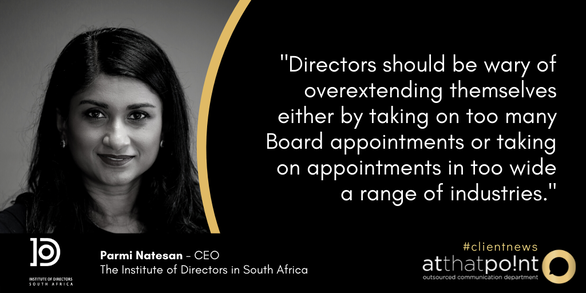|
The media reports about the luxurious mansion inhabited by the previous chairman of the National Lotteries Commission—reportedly funded by kickbacks—have provided a lot of information to worry and disgust even corruption-weary South Africans. But what about the snippet that the individual in question is a director of “at least 40 companies, including some involved in mining, investment and communications,” asks Parmi Natesan, CEO of the Institute of Directors in South Africa (IoDSA).
“While I can’t comment on this specific case as I don’t have the facts, it does raise a perennial issue that boards need to keep in mind—just how many boards can an individual sit on and still discharge his or her duties with sufficient care, skill and diligence?” she says. “Forty sounds like too many, but what is the correct number?”. One should not apply an inflexible rule to this, Ms Natesan believes, because individuals’ capacities and free time differ; in addition, some sectors and industries are more demanding than others. King IV simply states that a candidate for election as a non-executive director should declare his or her existing professional commitments and supply a statement that confirms he or she has sufficient time to fulfil his or her responsibilities as a member of the board (King IV, Principle 7, Recommended Practice 18). It should be borne in mind that non-executive directors (NEDs) have an increasingly important role to play, and can face potential personal liability for not fulfilling their duties. It’s also true that NEDs should be experienced in the particular industry in which the company operates. Both of these facts suggest that directors should be wary of overextending themselves either by taking on too many appointments or taking on appointments in too wide a range of industries. Internationally, it seems as though four board appointments is becoming accepted as the norm in the United States and Europe, while 1.3 board appointments are the median in Australia. PWC’s “Non-executive directors. Practices and fees trends report” for February 2022 indicates that ISS, the proxy advisor, seems to be advocating that directors holding five or more mandates should receive a negative vote from shareholders. The PWC report shows that the majority of South Africa’s NEDs (1 247) hold only one board position, with 207 holding two and 84 holding three. Thirty-four held four board seats, with the most held by any one person being six (two individuals). “In some cases, boards prefer NEDs to serve on more than one board to gain experience,” Ms Natesan says. “At the moment, it seems as though South African directors are not indulging in serial directorships to the extent that they cannot discharge their duties adequately—the former chairman of the National Lotteries Commission excepted, of course. Boards must keep an eye on this issue to ensure that their NEDs are neither overextended nor too isolated.” ENDS MEDIA CONTACT: Stephné du Toit, [email protected], 084 587 9933, www.atthatpoint.co.za For more information on the IoDSA please visit: Website: www.iodsa.co.za Twitter: @The_IoDSA LinkedIn: Institute of Directors in South Africa Company Page Facebook: Institute of Directors South Africa
0 Comments
Leave a Reply. |
Archives
July 2024
Categories
All
|


 RSS Feed
RSS Feed